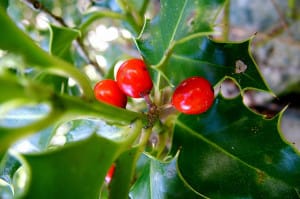 |
At least 15 elements of a traditional Christmas dinner party would never make it to the table without help from insects.
Scientists from the University of Bristol have compiled a list of essentials, from mistletoe to chocolate, and the insects that we have to thank for their commercial production.
The team is crowdfunding a project called “Come Dine With Bee” to establish the most nutritious 100 garden plants for bees. They will measure the amount of pollen and nectar the plants contain, validate their findings by counting how often pollinators visit them, and publish the results so that willing gardeners can do their bit to boost bee numbers.
Gardens and allotments are crucial resources for bees in urban landscapes.
But bees are not the only essential pollinators. Flies do their bit for many species – and flowers with longer tubes require long-tongued bees and butterflies.
Individual plants can sustain a range of pollinators, and vice versa.
Featured on the list are berries, spices, vegetables and decorations – and even chocolate, because cocoa flowers only make seed pods if they are visited by certain species of biting midge.
1. Mistletoe
To produce the delicate, pale berries, cross pollination is required. Flies and the wind do the job of getting the “male” and “female” parts of the plant together.
2. Holly
Holly is much prettier with berries. To produce berries, we need bees to pollinate the flowers.
3. Cranberries
In sauce, pink gin, tarts and table decorations, their rich colour is a must-have for Christmas. Flies, hoverflies and bees all pollinate the flowers that produce the fruit.
4. Parsnips
Being roots, they don’t require pollination to be edible. But parsnip plants do require pollination by bees and flies to produce seeds for commercial growing.
5. Brazil nuts and almonds
While hazelnuts and walnuts are wind-pollinated, Brazil nuts and almonds requirebees. Eaten by the handful or stirred into a cake mixture, nuts are part of Christmas and they’re rich in goodness too.
6. Sprouts
Sprouts are leaf buds and don’t require pollination, but we do need bees and fliesto produce the seeds for commercial growing.
7. Carrots
Like parsnips and sprouts, the part we eat is not dependent on pollinators. However, the production of seeds for the next year’s crop is dependent on pollination by flies and bees. The same also goes for the onion used in stuffing.
8. Sage
A classic flavour for stuffing. As well as bees, butterflies help pollinate the seed.
9. Cherries
A staple ingredient of Christmas cake, and the first to go missing if the cake is left out to pick at. Flies, hoverflies and bees are all required to produce the fruit.
10. Nutmeg
Its pollinator is more unusual – a type of beetle is needed to produce the edible part of the tree. As well as being an ingredient in Christmas pudding, nutmeg is sometimes used in bread sauce.
11. Cinnamon
The flowers are small, and small insects are required to produce the seed – most likely flies and bees.
12. Dairy products
The plants used in mixed pasture to improve milk quality, such as types of clover, vetches, chicory and plantain, all require pollination for next year’s crop. Butterflies, flies and bees help to do the job.
13. Cloves
Stuck in an onion for bread sauce, or an orange for mulled wine – their aroma is part of the magic of Christmas. The plants require bees to fertilise.
14. Chocolate
The food of the gods requires a pint-sized bug. Most cocoa flowers do not get pollinated and drop to the ground instead of turning into high-value pods. The key pollinator is a biting midge. More midges, more chocolate.
15. Apples
Apples are an essential ingredient of fruity mince pies. Apple tree flowers require hoverflies, flies and bees for pollination – and growers often hire in hives during the blooming season.

